The cycle of the seasons continues on without delay. This year the change is abrupt, but at the same time refreshing after a long record breaking hot summer. As the crisp air replaces the dry heat, I am adding another chapter to my thoughts about lessons learned.
Just a few days ago, I frolicked about in a t-shirt and shorts. Two days ago, my house was noticeably chilly when I awoke. I immediately checked the thermostat and sure enough the inside temperature had dropped to the low 60s. A quick flip of the switch brought on an instant rush of warmer air and the familiar smell that accompanies the first flow of hot air. I worked all day at the computer wearing a sweater, long pants, and a pair of warm socks. Yesterday morning I peeked out my window.The customary Colorado blue sky was replaced by gray ominous clouds. A slight dusting of snow covered the colorful foliage and patio furniture. When I journeyed outside I definitely needed more than one layer.
Every year, Rosh Hashanah and Yom Kippur remind me that fall is on the way. Yet each time when the temperature drops for the first time, I marvel at the wonder of it all. Nature at its prime.
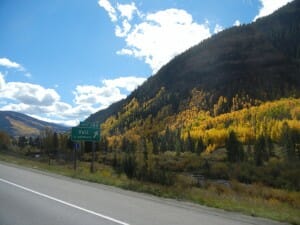
Like many who enjoy the outdoors, I am content to drive to the mountains to gaze upon the golden color of the aspens against the backdrop of the coniferous green trees. This year, we almost missed the beauty of this precious moment because the drought brought the change a bit earlier than normal.
I do miss the full specter of fall colors that is on display in my former hometown of Northbrook, Illinois. The brilliance of the one dimensional aspen trees cannot compare to the purples, reds, oranges, and yellows that blanket many forests in the Midwest. But then again, the flatlands of the northern suburbs of Chicago do not stack up to the majesty of the Rockies.
When we started raising our family in suburban Chicago, our fall experience was accentuated by the erection of a sukkah in our backyard. A sukkah is a temporary dwelling or booth that is used during the Festival of Sukkot or the Feast of the Tabernacles.
There are mandated rules regarding the building of this structure. The most fascinating aspect is the composition of its roof. The covering is a canopy that is made of organic materials that are arranged in such a way that there is more shade than sunlight and that the stars are visible at night.
In Chicago, we had bundles of coniferous tree branches delivered to our home. After positioning wooden beams across the top, the branches of greenery were carefully placed on top of the supports. The refreshing aroma inside the structure made you feel as if you were deep in a forest.
Through the years, I accumulated many laminated posters and plastic decorations that we used to make the interior more inviting. Freezing days like yesterday and today occasionally caused the pictures and plastic fruits and vegetables to become delaminated.
Weather permitting, our family ate as many meals as possible inside our sukkah. Guests were always welcomed throughout the holiday. I always extended an invitation to our sons’ preschool classes.
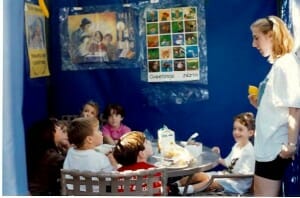
The kids looked forward to inviting their friends and teachers to our Sukkah party that took place without exception. Many people included us in their annual sukkah hop. Our list of invitees expanded and my baking snowballed.
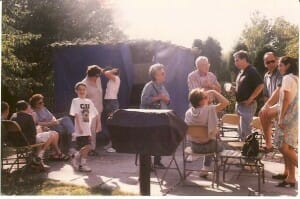
Our parties became notable for my homemade treats and vegetarian items. The weather cooperated most of the time. However, I do recall a few Sukkah parties celebrated inside our home.
Even though we transported our sukkah to Colorado, it was far too large for our new yard. With joy and anticipation of a new set of memories, I ordered a smaller sukkah. Locating a source for the schach was a challenge. We simply added bamboos poles as a covering and needed to buy more and more so that we could have more shade than direct sun.
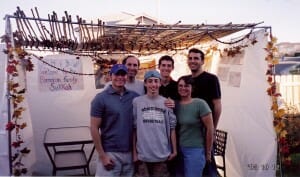
For several years, we continued this time honored tradition. I enjoyed the special moments when I sat alone in the sukkah as well as the times when I dined with others. Without any extended family or our list of former guests, our Sukkah parties ended up being far less spectacular.
As our children went their separate ways and moved to other places, our desire to erect a sukkah dwindled. With less assistance and health related issues, following this tradition became less important. The sukkah remained in the garage unassembled.
For the last few years, I have driven to our Denver synagogue so that I can fulfill the mitzvah of shaking the lulav and the etrog and dining in the sukkah. Even though I am participating in the prescribed tradition, a part of me is not content. The personal and family aspects of the holiday have shifted to a communal observance. My favorite holiday has gone flat and lost its vibrancy.
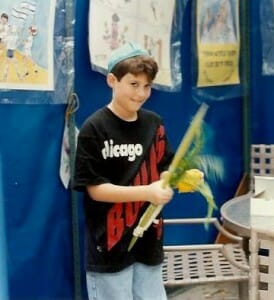
Yes, I must admit that it is my favorite. Why would I consider this little known biblical holiday so special? I have oodles and oodles of joyous memories that override all of the other holiday experiences.
- Building the sukkah as a family
- Placing the greenery or schach on top
- Creating and finding posters
- Decorating the interior
- Baking
- Entertaining our guests
- Meeting our children’s friends and teachers
- Introducing our non-Jewish guests or less knowledgeable Jewish guests to some of our traditions
- Dining inside
- Family time
- Moments of solitude when I reflected on my life
- Being reminded how lucky we are
Although we only spent time in the sukkah for eight days, the underlying message of the experience was powerful. Like the unstable sukkah that is easily affected by the unpredictable powers of nature, life is filled with uncertainty. When I sat in the sukkah and looked at the sky above, I was reminded of the precarious nature of life. The simplicity of the sukkah allowed me to view the world through a different set of lenses that removed the clutter and material aspects of my day-to-day existence. Many people do not have the good fortune to have a roof over their head every day and night.
My sukkah experiences always made me more appreciative. I relished the tranquility of sitting peacefully by myself in our sukkah. It was a much needed retreat from being on-call to four sons. I also cherished the meals we shared together as a family. A sense of joy was a natural by-product.
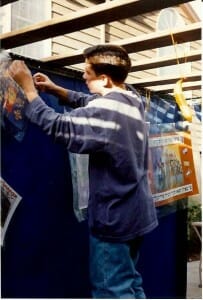
I loved the way our family worked together as a team to build and decorate our sukkah. Oftentimes, friends would drop by to lend a helping hand. We had fun. Our positive experience made us look forward to the next year.
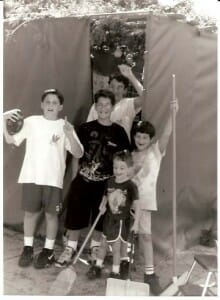
Sharing our sukkah with others was a way to extend the delightful nature of this lesser known holiday. I was happy that our family could extend an open invitation to join in our celebration of a Jewish tradition that had biblical roots. My passion became contagious.
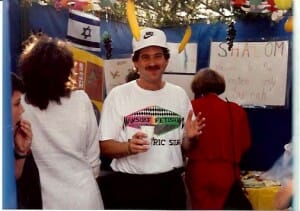
Many of our acquaintances and family members eagerly anticipated their yearly invitation and included us in their annual sukkah hop. Without a sukkah, I must now rely on a communal sukkah and my memories to reignite the joy.
This sense of emptiness mirrors my response to being an empty-nester. For decades, my attention was focused on my four sons’ daily life. As a stay-at-home mom, I was able to take part in all aspects of their development. I have a treasure trove of delightful memories.
Now that my children are all adults and living elsewhere, I participate in their lives from a distance. Although we still remain emotionally close, I must also rely on bits and pieces of the memorable times we shared as a family and cherish the future moments when we can be reunited.
The lessons learned from my Sukkot experiences can be applied to my empty-nester status. Even though my children are no longer physically nearby, I must find ways to retain the vibrancy of our family relationship. I need to remain grateful and appreciative of our shared family moments. Just like it is necessary to respond accordingly to variable weather conditions, it is vital that I remain flexible and adapt to changing stages in my life.
Related Blogs:
Picture Books for the High Holidays
8 Gifts for 8 Nights: Jewish Children’s Holiday Books
Chanukah- 2 New Picture Books and a Sweet Potato Recipe
Memorable Holocaust Picture Books
Purim and Freshly Baked Hamentaschen
Sandra’s Bio
Sandra Bornstein is the author of MAY THIS BE THE BEST YEAR OF YOUR LIFE. It is available on Amazon. Sandra’s memoir highlights her living and teaching adventure in Bangalore, India. She is a licensed Colorado teacher who has taught K-12 students in the United States and abroad as well as college level courses. Sandra is married and has four adult sons.
The memoir was a finalist in the Travel category for the 2013 Next Generation Indie Book Awards, the 2013 International Book Awards, the 2013 National Indie Book Excellence Awards, the 2013 USA Best Book Awards, and received an Honorable Mention award in the Multicultural Non-Fiction category for the 2013 Global ebook Awards.
If you’re interested in travel, follow Sandra’s latest adventures on Examiner.com.
Very heartwarming. Thoughtful and very well written.
Marilyn, Thanks.
Sandy,
I really enjoyed reading of your past Sukkots and of all the memories of those days and loved seeing the pictures of the boys as boys!
Thanks for sharing.
Faye
Faye,
As a child, I never celebrated Sukkot. I missed out on a wonderful tradition. I am so happy that Ira and I were able to provide our sons with amazing memories of this joyous holiday. Fortunately, I took the time to take pictures whenever I remembered. The photos add an additional layer to my recollections. They enhance the intended message of my story.
Hi Sandra,
I especially enjoyed your last paragraph about the need to find ways to maintain vibrancy and adapt to changing conditions. I used to clean for a Rabbi’s family and watch them erect a booth; I thought of it as the festival of booths. Temporary things can be wonderful too!
Stacy
Stacy,
Yes, there are multiple ways to refer to this festival. Feast of Booths, Festival of the Harvest, Festival of the Ingathering, and Festival of Adonai (God) are several other options. Even though the festival only lasts for a few days, it is considered the most joyous time in the Jewish calendar. I agree, temporary events can indeed be wonderful.